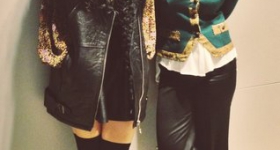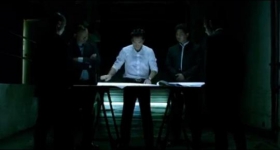(Photo via.)
This is one of a series of profiles of outstanding Asian American women Hyphen is presenting for Women's History Month. In honor of the passing of this landmark healthcare reform bill, the last three profiles will address healthcare issues.
It doesn't always take a long life to accomplish great things. I was 27 before I even felt I knew who I was, or what I wanted to do with my life. But Vineeta Rastogi's life ended at 27, leaving a lasting impact on the world.
While attending the University of Maryland, the young student was inspired by a professor to join the Peace Corps. She went to a small village in Zaire, where she funded and ran the area's first family planning program. (She also met her future husband on vacation in Kinshasa.)
She wrote this about the impact the experience had on her.
I crusaded through my villages implementing health education and family planning programs, preparing maternal and vaccination schedules, and allocating thousands of dollars in funds from OXFAM. I worked and worked and worked with these wonderfully warm and resilient Zairian people, and every so often I would decide my efforts to be futile. Tears would well in my eyes as I would question my place in Zaire, feeling miserably lonely and useless. My cries of frustration echoed through the Kingandu valley and rivers before they came back to haunt me again. I had nowhere to run but to confront my feelings of failure and reassess my ideas of success. Western culture indoctrinated me to believe achievement was tangibly the direct result of sacrifice and exertion. That would not hold now.
The passing of each day brought new light to my eyes. I began to discover life as I had never seen it before. My self-diagnosed predicament of despair was remedied by smiles and infectious laughter. Faceless people transformed into living, breathing, beautiful friends. I became a constant in my familiar. My happiness in Zaire was not dependent on how many health centers I supervised in one week, but rather, how I could bring love and trust into a person’s life; through the stomach or the heart. It did not matter. The beliefs I had come with to Zaire were slowly washed away to meet the real needs of the people and me. How could I feel inept to serve them when I was constantly showered with approval and adoration? We gave each other strength despite the snail’s pace progress.
I have found my life’s purpose in international public health service. To cherish the goodwill in serving others for no other benefit than knowing you have tried is one of life’s priceless lessons. Whether my work was grueling and seemingly fruitless at times, it was worth the toil and tears. Work teaches a personalized reality. I know this to be my truth.
After returning from Zaire, Rastogi enrolled in the Harvard School of Public Health, where she studied epidemiology, the study of how diseases spread and, more importantly, how to prevent them. She went above and beyond most students' call, spending vacations visiting clinics in Vietnam, El Salvador, Cuba, and India. Her work earned her the Albert Schweitzer Urban Fellowship.
Also an AIDS activist Rastogi was a delegate to Cairo’s International Conference on Population and Development, Yokohama’s International AIDS Conference, and the Asian-American Conference at the White House.
She had been accepted to the Johns Hopkins School of Public Health for a Ph.D -- and was a newlywed -- when she was diagnosed with cancer. Chosen to give the commencement address for her Harvard class, she explained her situation, and her personal mission, thus:
As Public Health professionals, we see one of the greatest challenges as the cause and cure of cancer. This quest became more important for me when, last fall, I was diagnosed with this illness. With no notice my life was confined to antiseptic hospital rooms, tied to chemotherapy lines. On my journey to a miraculous recovery, I lay in weakened state asking the question, "Why? Why me . . . why me?
But how much worse this would have been had I known the reason for my pain was simply my color, my religion, my race or my tribe?- characteristics a part of me, yet not really me at all. The broken, the injured, the grieving, and the displaced do not ask "Why me?". They know.
Compared to the bigots, drunken with hate, who reside in the hills of Sarajevo, the jungles of Rwanda, the swamps of Sudan, or sidewalks of abortion clinics, cancer seems almost benign.
... Luckily, unlike so many of the diseases we are fighting, a cure for strife exists. It is called education. As Willa Cather told us, "there is no such thing as creative hate." Education and creativity dissolve intolerance.
When the disease was terminal she started the Vineeta Rastogi Foundation to continue her life's work.
The organization, which most recently popped up on the radar co-sponsoring one of Obama's inaugural balls, serves a number of other public health NGOs by observing their work and providing support services. You can read about the org's programs here.
If the rest of us could find direction so quickly and so energetically, even in exchange for living only 27 years, imagine what kind of place the world would be. I don't know what moral to put on this story: go abroad, young wo/man? always help others? to thine own self be true? Maybe some combination of the above.









Comments